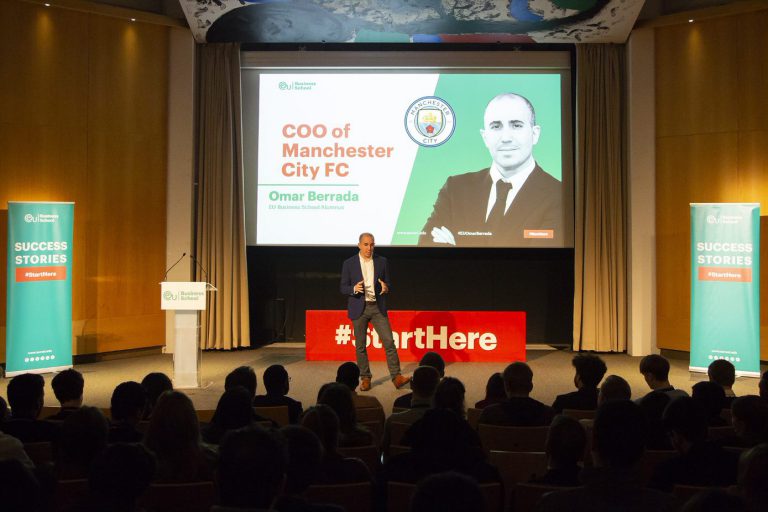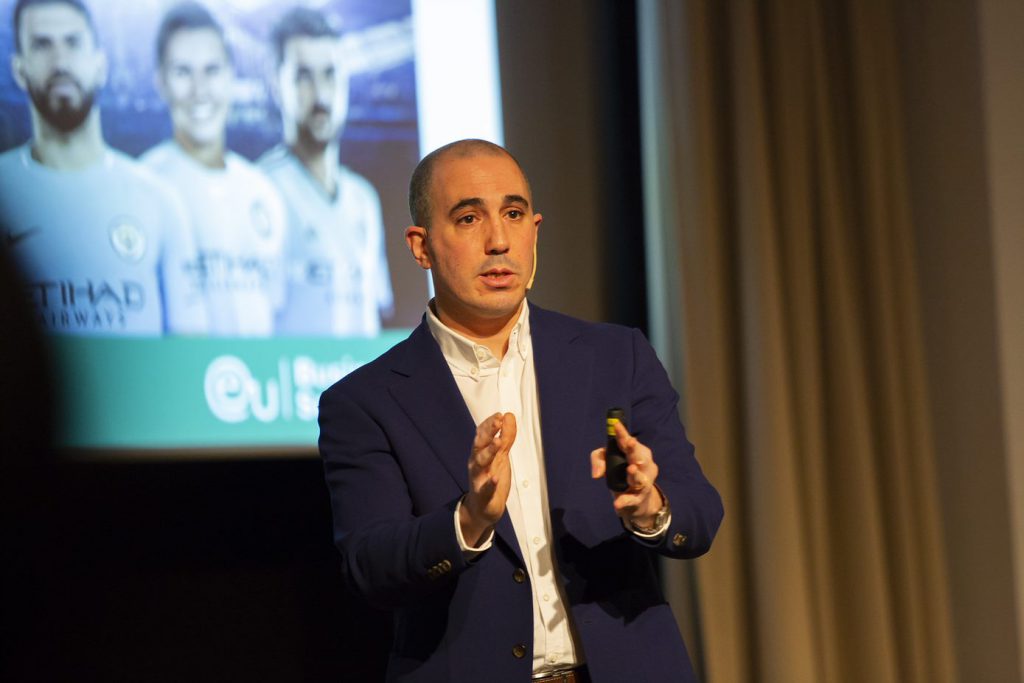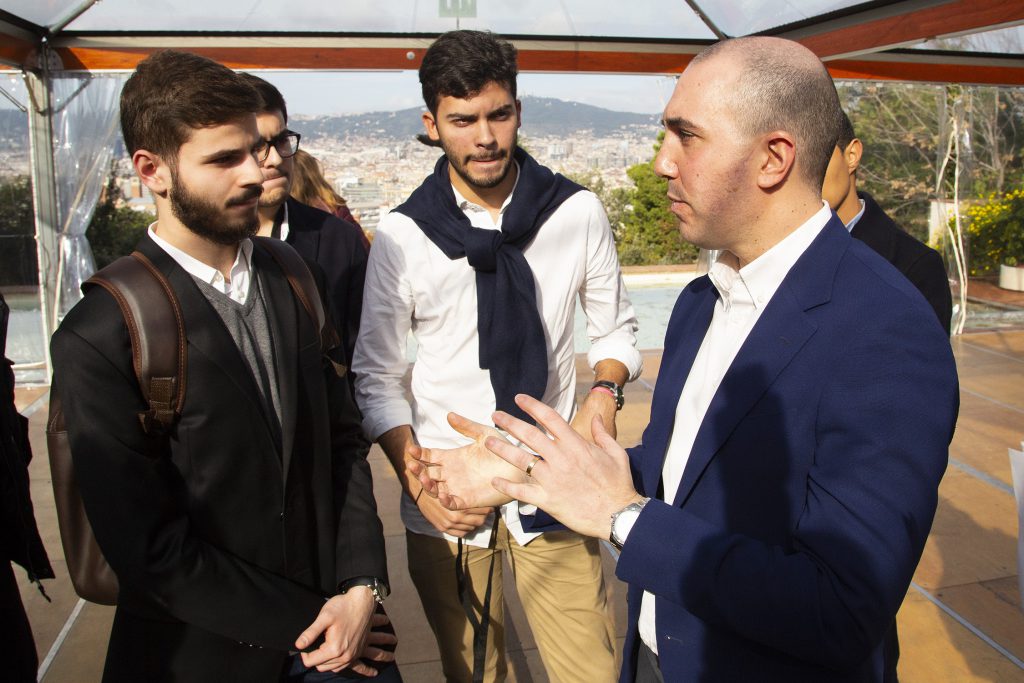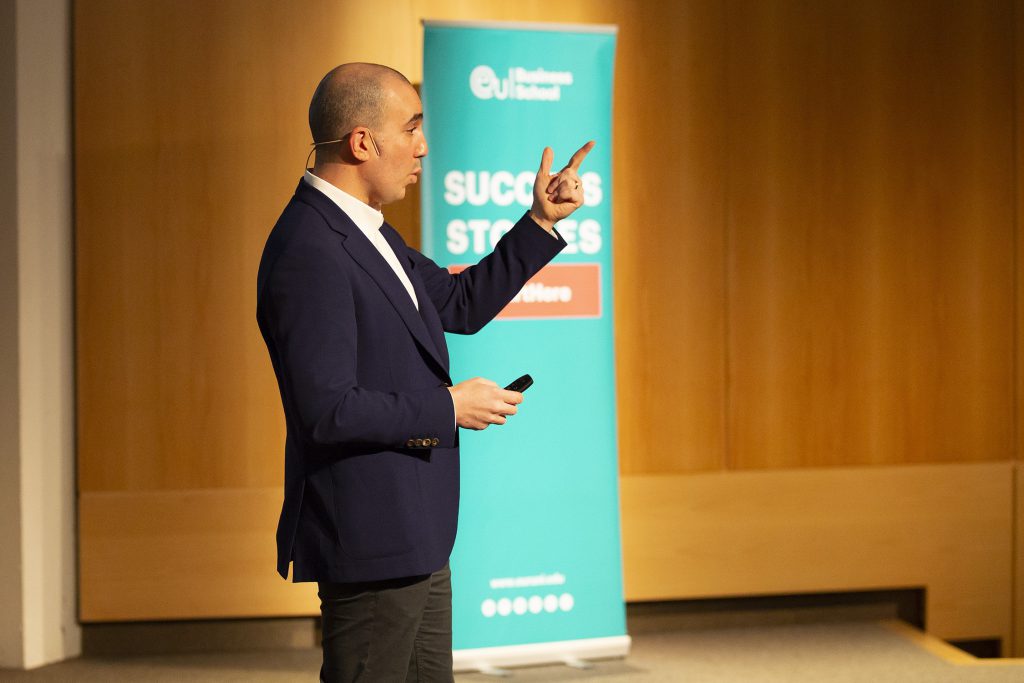Omar Berrada: The Business of Football
With the FIFA World Cup consistently ranked in the most watched television broadcasts in the world and club football ranging from the highest-level superstars to local teams, there is no doubt that the multi-billion-dollar industry draws in crowds of millions. With the beautiful game being the most participated sport in 59% of countries, the global impact of football is clear. Yet despite its global reach, many fans have little idea as to what goes on off the pitch or how intricate the business of football really is.

EU Business School (EU) were lucky enough to host COO of Manchester City F.C., EU alumnus Omar Berrada, at the Fundació Joan Miró in Barcelona, where he gave a fascinating behind-the-scenes account of this legendary club and gave tips to EU students about how to start a career in the football industry.
Manchester City F.C. A New Kind of Football Club
In 2012, Manchester City F.C., a club that had often been overshadowed by the success of its Mancunian neighbors, won the Premier League title in dramatic fashion. Since then, the team has won an additional two titles and counting, and broke numerous footballing records including breaking the 100-point mark in the Premier League under the management of football mastermind Pep Guardiola. The name Manchester City is now synonymous with success. But how did they make it possible?
Under new ownership since 2008 and with a clear and direct vision together with strong investment on the pitch, Manchester City F.C. set out to create a new kind of football group. With the belief that football is the only truly global sport and that to be global, there is a need to have local ventures across the world and engage with fans, they went further than just having one well-known, international club; via acquisitions and franchising, they began to invest in clubs around the world in a way that was truly meaningful.


What Makes City Football Group Unique?
In a first for football clubs, Manchester City F.C. set up the international conglomerate, City Football Group (CFG) to create their own global football brand. Taking a departure from the norm of other footballing giants and focusing solely on football, they invested in six clubs around the world, strategically positioning themselves and creating a unifying brand and style of play across their teams. Omar commented that, “it’s not just a question of having a global presence. It’s actually a business strategy to help us grow our revenues.” The end goal is for CFG to become successful and sustainable.
Each individual team acquisition has posed a different challenge and has a unique strategic objective for CFG. Their first venture was to create New York City F.C., a team they built from the ground up. At this time and for years, soccer had been continuously growing in popularity against more traditional sports such as baseball especially among the young in the U.S.A. By building a new club in this immense country, the group could engage with fans in the U.S.A. Teams traditionally take years to build up a fanbase with team loyalty often being passed down through generations of families. However, the franchise experiment was a success. In just three years, CFG were able to drum up enough support to see 40,000 supporters turn up for their first match at the famous Yankee stadium. Now New York City F.C. is ranked as having one of the largest fanbases in Major League Soccer.
Yokohoma F. Marinos posed a different challenge. Owned by Nissan whose headquarters are in the Yokohoma area, management saw the club as an important contribution to the local community. Fitting with Manchester City’s community roots, these two organizations realized that they could create a partnership. CFG bought shares in Yokohoma F. Marinos allowing the Japanese club to take advantage of their general football management know-how. In return Nissan became one of CFG’s first global sponsors.
Other investments that go beyond just being great football teams include Club Atletico Torque in Uruguay which allows CFG to have a strategic base in South America and to scout for new talent in this region renowned for its football prowess. At Girona F.C., young players gain experience by playing in top division games and expand their skills, preparing them to step-up in their footballing careers.


Acquiring or owning part of a franchise of these clubs has allowed CFG to build up fan engagement as well as producing and retaining the best footballing talent from around the world. A training vision for play in Manchester City F.C.’s very successful and particular attacking style is able to be implemented across their teams. This style and know-how influenced and created by Manchester City F.C.’s manager and a key part of CFG’s global brand, Pep Guardiola. Omar commented, “you need to be able to have success on the pitch to trigger all the commercial revenues that are going to come to be able to sustain a club.” Moreover, a global network of teams enables the group to create specific sponsorship deals for companies around the globe.
Part of CFG’s global and inclusive vision places importance on women’s football. With investment into women’s teams at both Manchester City F.C. and Melbourne City F.C., the former has enjoyed great success including getting into the semi-finals of the Champions League for the past two seasons. With their ‘Same city, same passion’ campaign they aim to give women’s football the opportunity to grow.
What is The Future of Football?
Omar also discussed what he believes the future of football will hold. Like many other global industries, he pointed to the rise of emerging technologies and digital media as key areas that is changing the industry.
The ways fans around the globe engage with their favorite football teams is constantly changing. Instead of turning up at the stadium week in and week out, fans are now watching matches on mobile devices, looking for game highlights instead of watching the entire match. Moreover, fans are becoming interested in the lives of players. The challenge for CFG is to find effective ways to engage with this new generation of fans through social media campaigns and player interactions.
Most football fans have played the video game FIFA, but e-sports are now becoming a competition in themselves, with organized competitive events taking place in front of stadiums. These are just some areas in which the world of sports and football are developing.


How to Get a Career in the Football Industry
The business of football is both complex and fascinating, encompassing a wide range of business skills spanning across many aspects of industry.
Getting a career in the footballing industry is highly-sought after. Omar pointed out that it is the unique and future business aspects of the industry that applicants should be focusing on. He foresees that artificial intelligence and data analysis will have a great impact on football, creating scope for new areas in which football can grow. Skills in these areas will be invaluable to football clubs in upcoming years.
Looking at upcoming trends, Omar’s top tip for those trying to get into the business of football is to diversify their business skills. Speaking on the key to his success he stated, “there’s an element of passion, loving what I do, loving sports. There’s an element of hard-work which is undeniable. The harder you work, the more recognized you will get. But I think what I’ve tried to do is to diversify my skill set as much as possible.”
Having a wealth of business knowledge in many areas allows a professional to be highly adaptable, a skill that Omar found incredibly useful in his career as it allowed him to consistently step into new roles which challenged him. Starting his footballing career as Head of Sponsorship at F.C. Barcelona, he quickly became interested in other commercial areas of football, diversifying his know-how. This enabled him to move into Partnerships and Sales at Manchester City F.C. and his eventual climb to COO.
A Business Education to Succeed in the Football Industry
Omar also emphasized the important role that EU played in the development of his career thanking his EU Business School education for helping him achieve the career he always dreamed of. He was able to diversify his business skills through the BBA he earned at EU, learning about a variety of business practices.
Beyond his excellent EU business education, he attributed part of his open-minded attitude and ability to adapt to new situations to the incredibly diverse student and faculty at the business school. He emphasized the opportunity he had to study on different campuses and build his international knowledge base. Intercampus exchange led him to Barcelona, a city he loves and one which introduced him to the professional world of football.
For more information on how to have a successful career in the football industry watch the interview with Omar, and if gaining the business skills to have a career in the football industry interests you, check out EU Business Schools degrees here.









